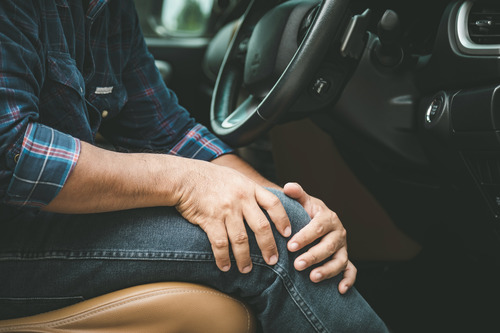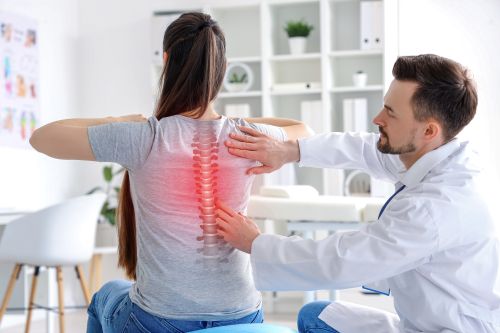Knee pain after a car accident is a common yet often underestimated issue that can range from mild discomfort to severe, life-altering injuries. The knee, a complex joint composed of bones, ligaments, tendons, and cartilage, is highly susceptible to damage during the sudden impact of a motor vehicle accident. Whether caused by dashboard injuries, ligament tears, or fractures, knee pain can significantly impact mobility, quality of life, and overall well-being.
In this blog, we’ll explore the causes, common types of knee injuries, symptoms, and treatment options for knee pain after a car accident, and highlight the importance of seeking medical attention, such as visiting a pain management clinic in Atlanta, to ensure proper care and recovery.
Causes of Knee Pain After a Car Accident
Understanding the causes of knee pain after a car accident can help victims identify their injuries and seek appropriate treatment. Here are two primary causes that often lead to knee injuries in these situations.
Sudden Impact and Trauma
When a car accident occurs, the sudden impact can cause significant trauma to the body, especially the knee joint. The force of the collision may lead to various injuries, including ligament tears, fractures, and soft tissue damage. For instance, if the knee strikes the dashboard during a collision, it can result in immediate pain and swelling. This sudden trauma can lead to both minor and severe knee injuries, affecting the knee’s overall function.
Dashboard Injury
Dashboard injuries are common in front-end collisions. When the knee strikes the dashboard, it can cause direct damage to the knee joint. This type of impact may result in a range of injuries, including:
- Kneecap fractures: Fractures to the patella can occur from the force of the knee hitting the dashboard.
- Ligament injuries: The anterior cruciate ligament (ACL) or medial collateral ligament (MCL) may be torn or stretched during the impact.
- Meniscus tears: The cartilage in the knee can also be damaged, leading to pain and instability.
Common Types of Knee Injuries
Knee pain after a car accident can manifest in various forms. Understanding these injuries is crucial for effective treatment and recovery. Here are some of the most common types of knee injuries that accident victims may experience:
Anterior Cruciate Ligament (ACL) Injuries
ACL injuries are prevalent in car accidents. The anterior cruciate ligament, located in the center of the knee, can be torn or sprained due to sudden stops or impacts. Symptoms often include severe pain, swelling, and instability in the knee joint.
Posterior Cruciate Ligament (PCL) Injuries
PCL injuries occur less frequently but are still significant. The posterior cruciate ligament stabilizes the knee and can be injured from a direct blow to the knee, such as hitting the dashboard during a collision. Symptoms include pain, swelling, and difficulty walking.
Medial Collateral Ligament (MCL) Injuries
MCL injuries involve damage to the ligament on the inner side of the knee. This injury can happen when the knee is pushed inward during an accident. Symptoms typically include pain on the inner knee, swelling, and a feeling of instability.
Meniscus Tears
The meniscus is a cartilage cushion in the knee that can tear during an accident. This injury often results from twisting motions or direct pressure. Symptoms include pain, swelling, and limited range of motion.
Kneecap (Patella) Fractures
Fractures of the kneecap can occur from a direct impact during a car accident. This type of injury leads to significant pain, swelling, and difficulty in bending the knee.
Tibial Plateau Fractures
These fractures involve the upper part of the tibia (shinbone) and can occur due to severe impacts. Symptoms include swelling, pain, and an inability to bear weight on the affected leg.
Knee Dislocations
A knee dislocation is a serious injury where the bones of the knee joint are out of place. This can result from high-impact collisions. Symptoms include extreme pain, swelling, and visible deformity in the knee.
Symptoms of Knee Injuries
After a car accident, knee injuries can manifest in various ways. Recognizing these symptoms is crucial for obtaining timely medical care and effectively managing recovery. Here are the most common signs to look out for:
Pain and Swelling
One of the most immediate symptoms of a knee injury is pain. This pain can range from mild discomfort to severe agony, often depending on the injury’s severity. Swelling typically accompanies this pain, as the body responds to trauma by sending fluids to the affected area. If you notice significant swelling, it may indicate a more serious injury, such as a ligament tear or fracture.
Instability and Reduced Range of Motion
Injured knees may feel unstable or give way during movement. This sensation can be alarming and may hinder your ability to walk or perform daily activities. Additionally, you might experience a reduced range of motion, making it difficult to bend or straighten your knee fully. If you struggle to move your knee as you normally would, it is essential to seek medical evaluation.
Muscle Spasms and Stiffness
Muscle spasms often occur following a knee injury as the body reacts to pain and trauma. These involuntary contractions can cause additional discomfort and limit mobility. Stiffness in the knee joint can also develop, making it challenging to move the leg freely. This stiffness may worsen after periods of inactivity, such as sleeping or sitting for long durations.
Treatment and Rehabilitation
After experiencing knee pain after a car accident, it is crucial to understand the appropriate treatment options available. The type of injury sustained will determine the best course of action, ranging from conservative care for minor injuries to more intensive interventions for severe injuries.
Minor Injuries: RICE and Conservative Care
For minor knee injuries, the RICE method is a widely recommended approach. RICE stands for Rest, Ice, Compression, and Elevation. This method helps reduce pain and swelling while promoting healing. Here’s how to implement it:
- Rest: Avoid putting weight on the affected knee. This means taking a break from physical activities that could aggravate the injury.
- Ice: Apply ice packs to the knee for 15-20 minutes every few hours. This helps reduce swelling and numb the pain.
- Compression: Use an elastic bandage or knee brace to wrap the knee. This provides support and limits swelling.
- Elevation: Keep the injured knee elevated above heart level when resting. This can help reduce swelling.
In addition to the RICE method, over-the-counter pain relievers like ibuprofen or acetaminophen can provide temporary relief from pain and discomfort. Gentle stretching and strengthening exercises may also be beneficial as the knee begins to heal.
Severe Injuries: Surgical Intervention and Physical Therapy
In cases of severe knee injuries, such as ligament tears, fractures, or dislocations, surgical intervention may be necessary. Procedures can range from arthroscopy to repair damaged ligaments to more extensive surgeries for fractures.
After surgery, a rehabilitation plan is essential for recovery. Physical therapy plays a critical role in restoring strength and mobility to the knee. A physical therapist will design a tailored program focusing on:
- Range of Motion Exercises: These help regain flexibility and prevent stiffness.
- Strengthening Exercises: Gradual strengthening of the muscles around the knee is vital for stability.
- Balance and Coordination Training: This helps enhance overall knee function and reduce the risk of future injuries.
The recovery process can take weeks to months, depending on the severity of the injury and the individual’s commitment to rehabilitation. Regular follow-ups with healthcare providers will help track progress and make necessary adjustments to the treatment plan.
Seek Pain Relief With Georgia Spine & Orthopaedics!
If you’re experiencing knee pain after a car accident, don’t wait to seek medical attention. Our team at Georgia Spine & Orthopaedics specializes in comprehensive care for accident-related injuries, including knee pain and ligament damage.
Contact us at 678-929-4494 to schedule an appointment with us today!






